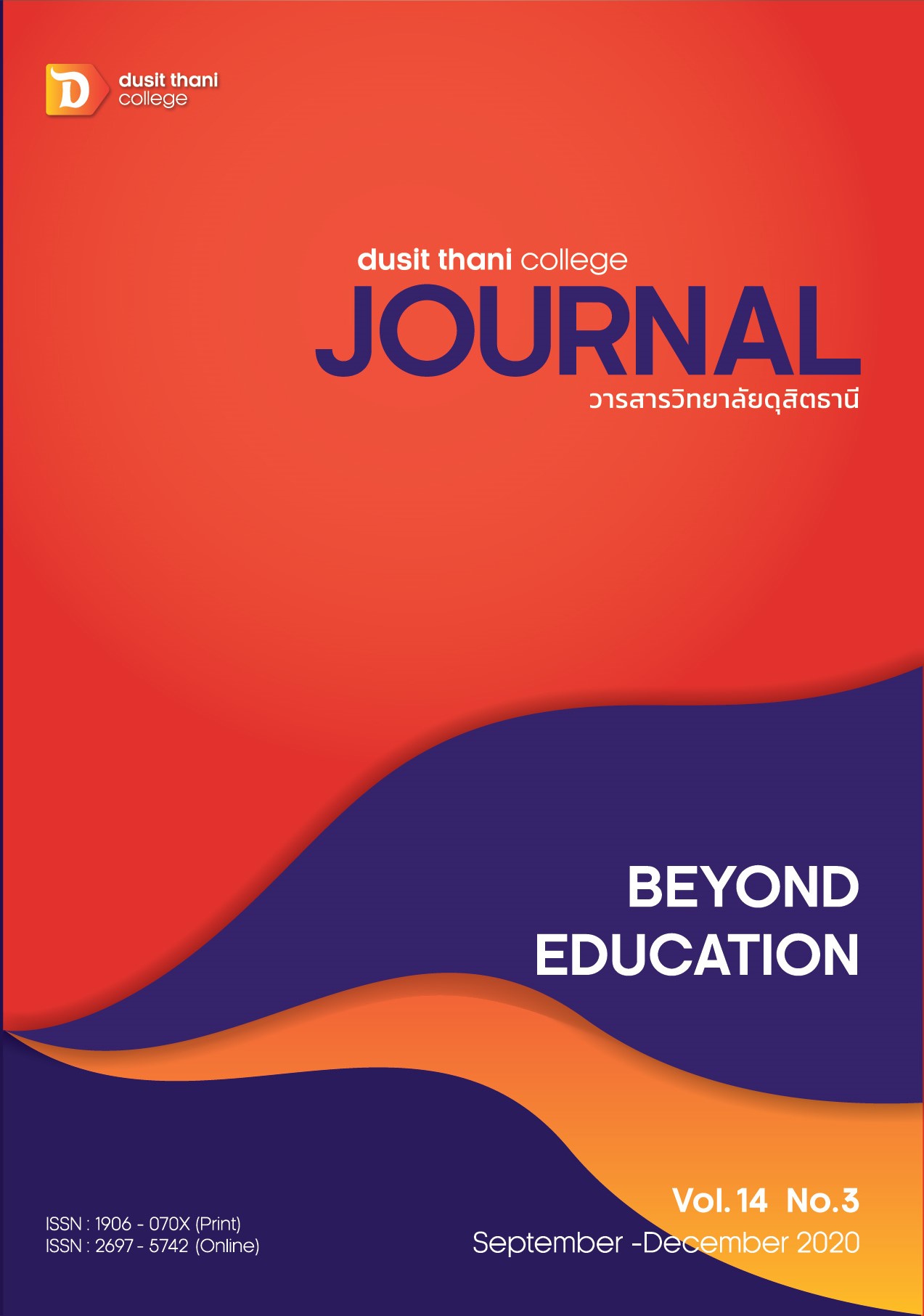The Relationship of Internal Control Affecting Performance of Accommodation Business in Rayong Province
Main Article Content
Abstract
The objectives of this study were 1) to study the level of opinions about internal control and 2) to examine the consistency of the relationship model of internal control affecting performance of accommodation business Rayong province. The sample group used in this research was the executives or the financial accounting officer in accommodation business Rayong province., Data were collected from 110 returned questionnaires. Data analysis used mean, standard deviation, pearson correlation coefficient and structural equation modelling (SEM) analysis.
The results of this research were as follow: 1) Internal control of the accommodation business, in overall and in each components is in a high level. 2) The result shown that the prototype model and empirical data are consistent which did pass the evaluation criteria model called "Model Fit". The internal control is based on the concept of COSO, consisting of 5 components which are Control environment, risk assessment, Control activity, Information and Communication, Monitoring and Evaluation. The internal control has been affecting the performance of accommodation business. Overall, the 5 components of internal control can be explained together in the variability and forecasting the performance of the accommodation business. The analysis of each aspect found that Risk assessment, information and communication Influencing the performance in accommodation business. Rayong province.
Article Details
Article Screening Policy
- All research and academic articles to be published must be considered and screened by three peer reviews in the relevant field / article.
- All articles, texts, illustrations and tables published in the journal are the personal opinions of the authors. Editors don't always have to agree. And no responsibility whatsoever is the sole responsibility of the author.
- The articles to be published must never be published. Where did you first publish? And not in the consideration of other journals If the audit found that there has been a duplicate publication It is the sole responsibility of the author.
- Any article that the reader sees as being plagiarized or impersonated without reference. Or mislead the work of the author Please let the journal editor know it will be your greatest blessing.
References
Akmese, H. & Gundogan, H. (2020). The role of internal control in hotel business:
a research on five-star hotels. Academic Review of Economics and Administrative Sciences, 13(2), 227-241.
Anh, T., Thi, L., Quang, H. & Thi, T. (2020). Factors influencing the effectiveness of internal control in cement manufacturing companies. Management Science Letters, 10(1), 133-142.
Aziz, M., Said, J., & Alam, M. (2015). Assessment of the practices of internal control system in the public sectors of Malaysia. Aziz, MAA, Said, J., and Alam, MM, 43-62.
Buathongrueang, Kannika. & Silarak Siriwan. (2018). Guidelines for Development of Internal Control System for the Success of Hotel Business Management in Trang Province. National research presentations The 11th Phuket Rajabhat University. (in Thai)
COSO, 2013, Internal Control - Integrated Framework: Executive Summary, Committee of Sponsoring Organizations of the Treadway Commission.
Giriunas, L. & Giriuniene, G. (2014). Role of internal control in company management procedures: theoretical aspect. PURUSHARTHA-A journal of Management, Ethics and Spirituality, 7(2), 60-71.
Hair, J. F. Black. WC, Babin., BJ, Anderson RE. (2010). Multivariate data analysis, a global perspective. New Jersey. Pearson. Ed, 7, 816.
Kurniadi, L. & Zio, L. (2011). The Role of Internal Control in the Operation of Hotels. BUSP03 Degree Project, 15 ECTS Master Thesis in Accounting and Auditing, Lund, Sweden, 31 May.
Kumuthinidevi, S. (2016). A Study of Effectiveness of the Internal Control System in the Private Banks of Trincomalee. International journal of scientific and research publications, 6(6), 71-91.
K SME Analysis. (2018). Hotel Business Trends 2018. (online). From: https://www.kasikornbank.com/th/business/sme/KSMEKnowledge/article/KSMEAnalysis/Documents/Competitive-Hotel-Industry_FullPage.pdf. March, 15 2018.
National Statistical office. (2018). The 2018 Accommodation Survey. (online). From: http://www.nso.go.th/sites/2014/DocLib13/ด้านเศรษฐกิจ/สาขาการท่องเที่ยวและกิฬา/ที่พักแรม/2561/Full_report.pdd.
Ongeri, S. N. (2010). An Assessment of the Effectiveness of Internal Audit Systems in the Management of Decentralized Funds in Kenya. Unpublished Research Thesis. University of Nairobi.
Putra, I. W. G. Y. D., Astika, I. B. P., RM, K. M. & Suprasto, H. B. (2018). The Effect of Internal Control System, Tri Hita Karana Culture and Good Governance on Government Performance. International Journal of Sciences: Basic and Applied Research (IJSBAR) (2018) 42(3), 26-37.
Sigilai, D. K. (2017). Assessment of Internal Control Systems Effects on Revenue Collection at Nakuru Level Five Hospital (Doctoral dissertation, COHRED-JKUAT).
Silpjaru, Tanin. (2018). Research and analysis of statistical data with SPSS and AMOS. (18th ed.) Bangkok : Business Publishing R & D.
The Stock Exchange of Thailand. (2016). Internal control for IPO companies. (online). From: https://www.set.or.th/th/products/listing2/files/SET_IPO_Focus_Intensive_ Internal_Control_for_Success_IPO.pdf. April, 20 2018.
Umar, H. & Dikko, M. U. (2018). The effect of internal control on performance of commercial banks in Nigeria. International Journal of Management Research & Review, 8(6),13-32.
Vanichbuncha, Kanlaya. (2013). Analysis of structural equations with AMOS. Bangkok : Chulalongkorn University Press.
Yemer, M. (2017). The Effect of Internal Controls Systems on Hotels Revenue.
A Case of Hotels in Bahir Dar and Gondar Cities. Arabian Journal of Business and Management Review (Oman Chapter), 6(6), 19.
Yodchasuwan, Nuttanth. (2015). Problems of Internal Control in Hotel Businesses in Chiang Mai Province. Chiang Mai University.


